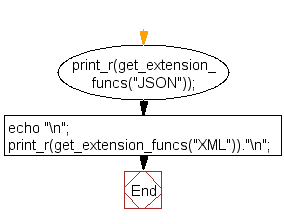PHP Exercises : Get the names of the functions of a module
PHP : Exercise-29 with Solution
Write a PHP script to get the names of the functions of a module.
Note : Find XML, JSON functions
Sample Solution: -
PHP Code:
<?php
print_r(get_extension_funcs("JSON"));
echo "\n";
print_r(get_extension_funcs("XML"))."\n";
?>
Sample Output:
Array
(
[0] => json_encode
[1] => json_decode
[2] => json_last_error
[3] => json_last_error_msg
)
Array
(
[0] => xml_parser_create
[1] => xml_parser_create_ns
[2] => xml_set_object
[3] => xml_set_element_handler
[4] => xml_set_character_data_handler
[5] => xml_set_processing_instruction_handler
[6] => xml_set_default_handler
[7] => xml_set_unparsed_entity_decl_handler
[8] => xml_set_notation_decl_handler
[9] => xml_set_external_entity_ref_handler
[10] => xml_set_start_namespace_decl_handler
[11] => xml_set_end_namespace_decl_handler
[12] => xml_parse
[13] => xml_parse_into_struct
[14] => xml_get_error_code
[15] => xml_error_string
[16] => xml_get_current_line_number
[17] => xml_get_current_column_number
[18] => xml_get_current_byte_index
[19] => xml_parser_free
[20] => xml_parser_set_option
[21] => xml_parser_get_option
[22] => utf8_encode
[23] => utf8_decode
)
Flowchart:

PHP Code Editor:
Have another way to solve this solution? Contribute your code (and comments) through Disqus.
Previous: Write a PHP script to get the directory path used for temporary files.
Next: Write a PHP script to get the time of the last modification of the current page.
What is the difficulty level of this exercise?
Test your Programming skills with w3resource's quiz.
PHP: Tips of the Day
How to Sort Multi-dimensional Array by Value?
Try a usort, If you are still on PHP 5.2 or earlier, you'll have to define a sorting function first:
Example:
function sortByOrder($a, $b) {
return $a['order'] - $b['order'];
}
usort($myArray, 'sortByOrder');
Starting in PHP 5.3, you can use an anonymous function:
usort($myArray, function($a, $b) {
return $a['order'] - $b['order'];
});
And finally with PHP 7 you can use the spaceship operator:
usort($myArray, function($a, $b) {
return $a['order'] <=> $b['order'];
});
To extend this to multi-dimensional sorting, reference the second/third sorting elements if the first is zero - best explained below. You can also use this for sorting on sub-elements.
usort($myArray, function($a, $b) {
$retval = $a['order'] <=> $b['order'];
if ($retval == 0) {
$retval = $a['suborder'] <=> $b['suborder'];
if ($retval == 0) {
$retval = $a['details']['subsuborder'] <=> $b['details']['subsuborder'];
}
}
return $retval;
});
If you need to retain key associations, use uasort() - see comparison of array sorting functions in the manual
Ref : https://bit.ly/3i77vCC
- New Content published on w3resource:
- HTML-CSS Practical: Exercises, Practice, Solution
- Java Regular Expression: Exercises, Practice, Solution
- Scala Programming Exercises, Practice, Solution
- Python Itertools exercises
- Python Numpy exercises
- Python GeoPy Package exercises
- Python Pandas exercises
- Python nltk exercises
- Python BeautifulSoup exercises
- Form Template
- Composer - PHP Package Manager
- PHPUnit - PHP Testing
- Laravel - PHP Framework
- Angular - JavaScript Framework
- Vue - JavaScript Framework
- Jest - JavaScript Testing Framework
